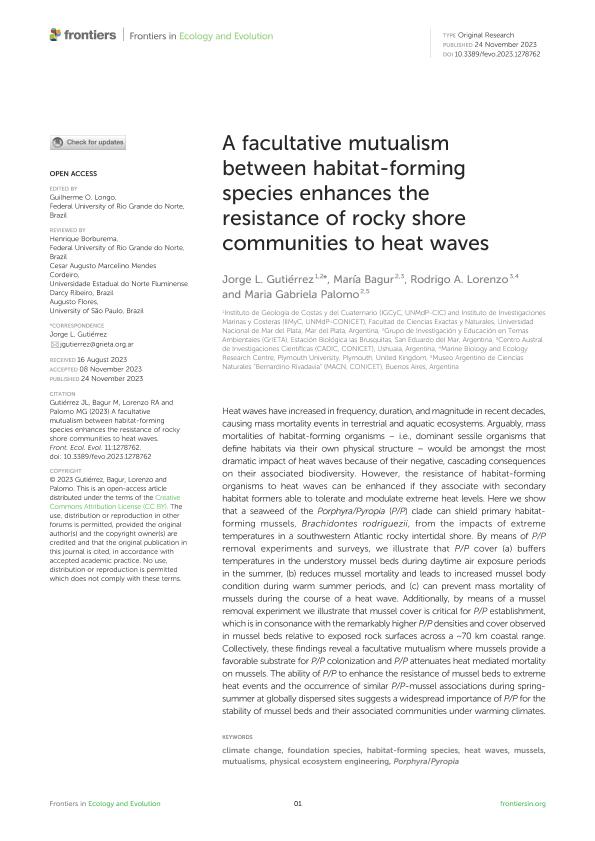Mostrar el registro sencillo del ítem
dc.contributor.author
Gutierrez, Jorge Luis Ceferino

dc.contributor.author
Bagur D'andrea, María Sol

dc.contributor.author
Lorenzo, Rodrigo Antonio

dc.contributor.author
Palomo, Maria Gabriela

dc.date.available
2024-01-26T12:34:05Z
dc.date.issued
2023-11
dc.identifier.citation
Gutierrez, Jorge Luis Ceferino; Bagur D'andrea, María Sol; Lorenzo, Rodrigo Antonio; Palomo, Maria Gabriela; A facultative mutualism between habitat-forming species enhances the resistance of rocky shore communities to heat waves; Frontiers Media; Frontiers in Ecology and Evolution; 11; 11-2023; 1-13
dc.identifier.uri
http://hdl.handle.net/11336/224951
dc.description.abstract
Heat waves have increased in frequency, duration, and magnitude in recent decades, causing mass mortality events in terrestrial and aquatic ecosystems. Arguably, mass mortalities of habitat-forming organisms – i.e., dominant sessile organisms that define habitats via their own physical structure – would be amongst the most dramatic impact of heat waves because of their negative, cascading consequences on their associated biodiversity. However, the resistance of habitat-forming organisms to heat waves can be enhanced if they associate with secondary habitat formers able to tolerate and modulate extreme heat levels. Here we show that a seaweed of the Porphyra/Pyropia (P/P) clade can shield primary habitat-forming mussels, Brachidontes rodriguezii, from the impacts of extreme temperatures in a southwestern Atlantic rocky intertidal shore. By means of P/P removal experiments and surveys, we illustrate that P/P cover (a) buffers temperatures in the understory mussel beds during daytime air exposure periods in the summer, (b) reduces mussel mortality and leads to increased mussel body condition during warm summer periods, and (c) can prevent mass mortality of mussels during the course of a heat wave. Additionally, by means of a mussel removal experiment we illustrate that mussel cover is critical for P/P establishment, which is in consonance with the remarkably higher P/P densities and cover observed in mussel beds relative to exposed rock surfaces across a ~70 km coastal range. Collectively, these findings reveal a facultative mutualism where mussels provide a favorable substrate for P/P colonization and P/P attenuates heat mediated mortality on mussels. The ability of P/P to enhance the resistance of mussel beds to extreme heat events and the occurrence of similar P/P-mussel associations during spring-summer at globally dispersed sites suggests a widespread importance of P/P for the stability of mussel beds and their associated communities under warming climates.
dc.format
application/pdf
dc.language.iso
eng
dc.publisher
Frontiers Media

dc.rights
info:eu-repo/semantics/openAccess
dc.rights.uri
https://creativecommons.org/licenses/by/2.5/ar/
dc.subject
CLIMATE CHANGE
dc.subject
FOUNDATION SPECIES
dc.subject
HABITAT-FORMING SPECIES
dc.subject
HEAT WAVES
dc.subject
MUSSELS
dc.subject
MUTUALISMS
dc.subject
PHYSICAL ECOSYSTEM ENGINEERING
dc.subject
PORPHYRA/PYROPIA
dc.subject.classification
Ecología

dc.subject.classification
Ciencias Biológicas

dc.subject.classification
CIENCIAS NATURALES Y EXACTAS

dc.title
A facultative mutualism between habitat-forming species enhances the resistance of rocky shore communities to heat waves
dc.type
info:eu-repo/semantics/article
dc.type
info:ar-repo/semantics/artículo
dc.type
info:eu-repo/semantics/publishedVersion
dc.date.updated
2023-12-22T15:37:41Z
dc.identifier.eissn
2296-701X
dc.journal.volume
11
dc.journal.pagination
1-13
dc.journal.pais
Suiza

dc.journal.ciudad
Lausana
dc.description.fil
Fil: Gutierrez, Jorge Luis Ceferino. Consejo Nacional de Investigaciones Científicas y Técnicas. Centro Científico Tecnológico Conicet - Mar del Plata. Instituto de Investigaciones Marinas y Costeras. Universidad Nacional de Mar del Plata. Facultad de Ciencias Exactas y Naturales. Instituto de Investigaciones Marinas y Costeras; Argentina. Universidad Nacional de Mar del Plata. Facultad de Ciencias Exactas y Naturales. Instituto de Geología de Costas y del Cuaternario. Provincia de Buenos Aires. Gobernación. Comisión de Investigaciones Científicas. Instituto de Geología de Costas y del Cuaternario; Argentina. Estación Biológica las Brusquitas; Argentina
dc.description.fil
Fil: Bagur D'andrea, María Sol. Consejo Nacional de Investigaciones Científicas y Técnicas. Centro Austral de Investigaciones Científicas; Argentina. Estación Biológica las Brusquitas; Argentina
dc.description.fil
Fil: Lorenzo, Rodrigo Antonio. Consejo Nacional de Investigaciones Científicas y Técnicas. Centro Austral de Investigaciones Científicas; Argentina. University Of Plymouth; Reino Unido
dc.description.fil
Fil: Palomo, Maria Gabriela. Consejo Nacional de Investigaciones Científicas y Técnicas. Oficina de Coordinación Administrativa Parque Centenario. Museo Argentino de Ciencias Naturales "Bernardino Rivadavia"; Argentina. Estación Biológica las Brusquitas; Argentina
dc.journal.title
Frontiers in Ecology and Evolution
dc.relation.alternativeid
info:eu-repo/semantics/altIdentifier/url/https://www.frontiersin.org/articles/10.3389/fevo.2023.1278762/full
dc.relation.alternativeid
info:eu-repo/semantics/altIdentifier/doi/http://dx.doi.org/10.3389/fevo.2023.1278762
Archivos asociados
